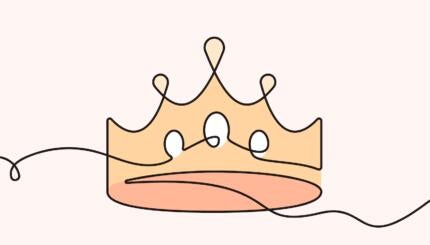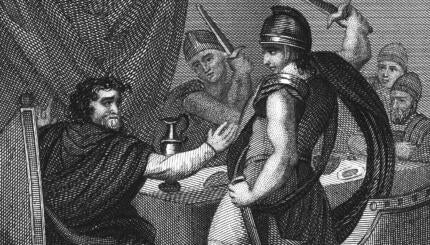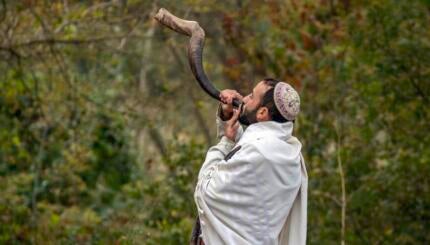You can’t build Jewish identity around fighting antisemitism. That’s an assertion I hear a lot these days from rabbis and teachers, from Jewish professionals and parents. But the message is always given as a reaction to the fact that many Jews do, in fact, feel more connected to their people and their Judaism when things are at their worst for the Jews. A call to protect our people can in fact lead to a rich and meaningful Jewish life.
As we begin the book of Exodus this week, I am struck that this is the story of Moses. Growing up in the palace of the Egyptian Pharaoh, Moses is raised without connection to his identity. The Torah gives us no indication that he knows the Israelites are his people until he is grown: “Some time after that, when Moses had grown up, he went out to his kinsfolk and witnessed their labors. He saw an Egyptian beating a Hebrew, one of his kinsmen.” (Exodus 2:11)
In the same breath that Moses first finds his people, he finds they are being oppressed. We aren’t told how Moses knows he is Israelite. Ancient commentators have suggested that maybe his mother’s milk was so potent it instilled a sense of identity. Or perhaps she secretly taught him about Abraham and God as a nursing toddler. The Ten Commandments and The Prince Of Egypt both have Pharaoh’s daughter telling Moses directly that he’s an Israelite. But however the news reaches him, the first thing he knows as an adult about his people is that they are suffering.
This one verse tells us so much. We learn about the hard labor impacting the whole nation, and we also get a more specific picture of abuse as Moses watches his kinsman (or brother, in a more literal translation) beaten before his eyes. And we see Moses confronts this fact because “he went out” — that is, he made a deliberate choice to discover it. Moses doesn’t learn about the plight of his people because the information comes to him, but because he leaves the comfort and safety of the palace and goes looking.
With your help, My Jewish Learning can provide endless opportunities for learning, connection and discovery.
In this way, Moses paves a path that generations of Jews will follow. His first connection to his people comes from a place of visceral outrage at the suffering they experience simply for being the children of Israel. Seeing their suffering is what commands Moses’s allegiance and sparks a shift in his primary identity from that of the culture he was raised in to the Israelites, who he will eventually come to lead.
Moses’s relationship with his people starts with learning about their mistreatment, but it doesn’t end there. This realization leads Moses directly into relationship with God. After killing the Egyptian he had witnessed oppressing his brother, Moses flees to the wilderness where he has his first spiritual encounter at the burning bush, finding God in nature through careful attention and by noticing a small, otherwise insignificant miracle. Like many of us, this first connection to God happens in a quiet moment when Moses turns aside from his usual path and listens.
And what Moses hears in this first encounter is an instruction to redeem his people. We may think of these impulses as very separate today — there are Jews who relate to their Judaism mainly through God and spirituality, and there are those who center the fight against antisemitism. But for Moses, these are one and the same. Moses finds God in the sacred task of learning to speak for his people. He teaches us that having a relationship with God can come from a desire to protect your fellow Jews, and vice versa — having a God-centered Jewish life doesn’t mean the safety of your people is peripheral.
Moses’ first task is to help God free the Israelites from slavery and leave the hard labor and oppression behind. His next job is to receive the Torah. Moses is the redeemer and the rabbi. He fights for justice and brings his people closer to God through commandments. The same leader who brings the plagues then climbs Mount Sinai and delivers the Torah. He reminds us that a full Jewish life is found not only through fighting antisemitism or building a relationship with the divine, but by engaging in both and allowing each to act as a pathway toward the other.
My natural instinct is to identify as a Torah-and-mitzvot Jew. For me, this past year has been one of pushing myself to go out and find my role in addressing the increasingly threatening antisemitism facing our people. For many Jews who identify more with fighting anti-Jewish bigotry, the inverse has been the case — this year has aroused a new desire to explore Torah and ritual. The story of Moses reminds us that these inclinations aren’t as distinct as they appear: Standing up for our people can lead to a deeper engagement with Torah, which in turn can lead to a deeper concern for Jewish safety. Moses is brave enough and creative enough and holy enough to hold these mandates together, and to see them as one. May we learn from his example.
This article initially appeared in My Jewish Learning’s Shabbat newsletter Recharge on January 18, 2025. To sign up to receive Recharge each week in your inbox, click here.



